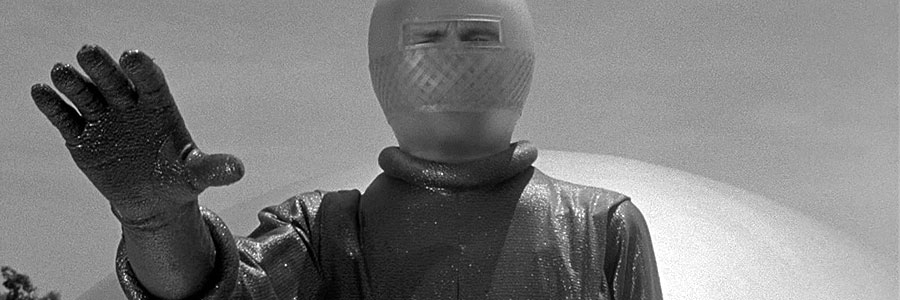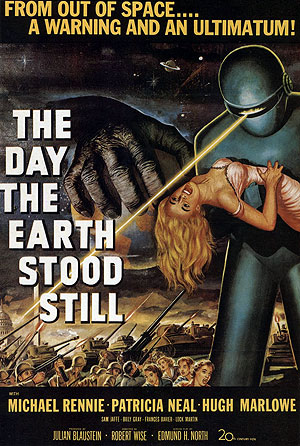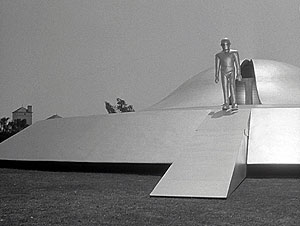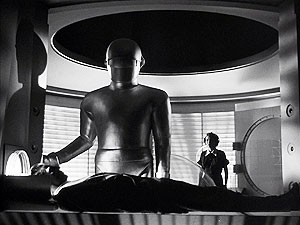
The Day The Earth Stood Still

THE DAY THE EARTH STOOD STILL (MOVIE)
Twentieth Century Fox
Original release: September 28th, 1951
Running time: 92 minutes
Director: Robert Wise
Writers: Edmund H. North (screenplay), Harry Bates (story)
Cast: Michael Rennie, Patricia Neal, Billy Gray

When I was younger, as with so many people I’m sure, I found old black and white movies awfully dated. I thought the people were far too obviously ‘acting’, that the sets and monsters looked fake and thus no amount of storytelling nous or dramatic tension could compensate for something more modern and slick.
I recall my first viewing of Dracula (1931) being a negative one as the shots of the bat hovering at the window destroyed the moment for me. I guess I could’nt, at that time, suspend my disbelief completely enough.
That all changed when I first saw Robert Wise’s The Day The Earth Stood Still. I remember it being late at night, I’d rented the film and had it playing in the background whilst I was working at something else. Needless to say, I got very little done. From the moment the eerie science fiction music played over the titles and an unidentified flying object landed in the President’s Park Ellipse in Washington, I couldn’t tear my eyes from the screen.
The 1950’s was a ripe period for what has now become recognised as a golden age for Science Fiction cinema and this film was one of the fore-runners for this. All great Sci-Fi reflects the surrounding world and a great number of films of this time capitalised on the paranoia that surrounded the Cold War by using invading aliens as a substitute for Communists. The Day The Earth Stood Still instead places the central alien, Klaatu (Michael Rennie), as a quasi-messianic figure arriving on our small blue planet to deliver an ultimatum to all humanity, regardless of nationality.
Michael Rennie is wonderful as the alien who has to deliver a stern warning and also learn about the people of the planet. His first encounter with humans is a perfectly framed example of why he’s on this mission. This incredibly elegant and slender man steps from his flying saucer in his sliver uniform and flanked by his eight foot robot – and is shot in the hand by an overzealous American soldier when he takes something from his pocket. There we have humanity’s problem – Klaatu was retrieving a gift for the American president that would enlighten the human race, and it’s now destroyed.

Having slipped out of military custody, Klaatu assumes the identity Mr Carpenter and takes a room in a boarding house in the hope of getting to know humanity. He becomes friendly with a young boy named Bobby (Billy Gray) and his mother Helen (Patricia Neal). Billy shows Mr Carpenter around Washington, visiting the Lincoln Memorial and Arlington Cemetery. Here we come to understand, through Rennie’s thoughtful performance, that he comes from a planet that doesn’t know war, suffering or killing on the scale our civilisations have experienced.
There are some truly thrilling moments as Klaatu’s robotic bodyguard Gort reacts to his initial assault by melting the nearby tanks and destroying guns with a laser beam from his eye. There’s a great scene where Helen is confronted by Gort and uttering the now legendary words “Klaatu barada nikto” to placate him. And of course, the pièce de résistance is Klaatu’s show of power to try to convince the people of Earth that he must be afforded the chance to speak to them, cutting out electricity all across the globe.
What resonates with me most from The Day The Earth Stood Still is its ultimate theme. Klaatu is on Earth to warn us against the dangers of aggression and nuclear war. His people have observed our continuous in-fighting and whilst they care  not to intervene, once humans began to work on rockets, our war-mongering species were becoming a threat to the peaceful stability of the galaxy. If humans make it into space and carry their aggression forward, the entire planet will be destroyed.
not to intervene, once humans began to work on rockets, our war-mongering species were becoming a threat to the peaceful stability of the galaxy. If humans make it into space and carry their aggression forward, the entire planet will be destroyed.
Having seen the hostile reaction to Klaatu’s own presence on the planet, including twice being assaulted by the American military, and our inability to pull together a council of representatives from every planet to hear his warning, the film isn’t entirely positive. Klaatu doesn’t leave Earth having been convinced of our value. Though he’s encountered a few humans who’ve responded in a fitting manner to him, he delivers a chilling final speech which goes to solidify our previous expectations; “continue as you are going and you will be destroyed.”
This is ultimately the message to take away from Wise’s film and it’s just as relevant without the alien visitor to replace our own moral conscience. It’s a gripping film and I have to thank it for opening my eyes to old movies.

Ben Nicholson
Ben has had a keen love of moving images since his childhood but after leaving school he fell truly in love with films. His passion manifests itself in his consumption of movies (watching films from all around the globe and from any period of the medium’s history with equal gusto), the enjoyment he derives from reading, talking and writing about cinema and being behind the camera himself having completed his first co-directed short film in mid-2011.
His favourite films include things as diverse as The Third Man, In The Mood For Love, Badlands, 3 Iron, Casablanca, Ran and Grizzly Man to name but a few.
Ben has his own film site, ACHILLES AND THE TORTOISE, and you can follow him on Twitter @BRNicholson.
© 2022 STATIC MASS EMPORIUM . All Rights Reserved. Powered by METATEMPUS | creative.timeless.personal. | DISCLAIMER, TERMS & CONDITIONS
HOME | ABOUT | CONTACT | TWITTER | GOOGLE+ | FACEBOOK | TUMBLR | YOUTUBE | RSS FEED
CINEMA REVIEWS | BLU-RAY & DVD | THE EMPORIUM | DOCUMENTARIES | WORLD CINEMA | CULT MOVIES | INDIAN CINEMA | EARLY CINEMA
MOVIE CLASSICS | DECONSTRUCTING CINEMA | SOUNDTRACKS | INTERVIEWS | THE DIRECTOR’S CHAIR | JAPANESE CINEMA





